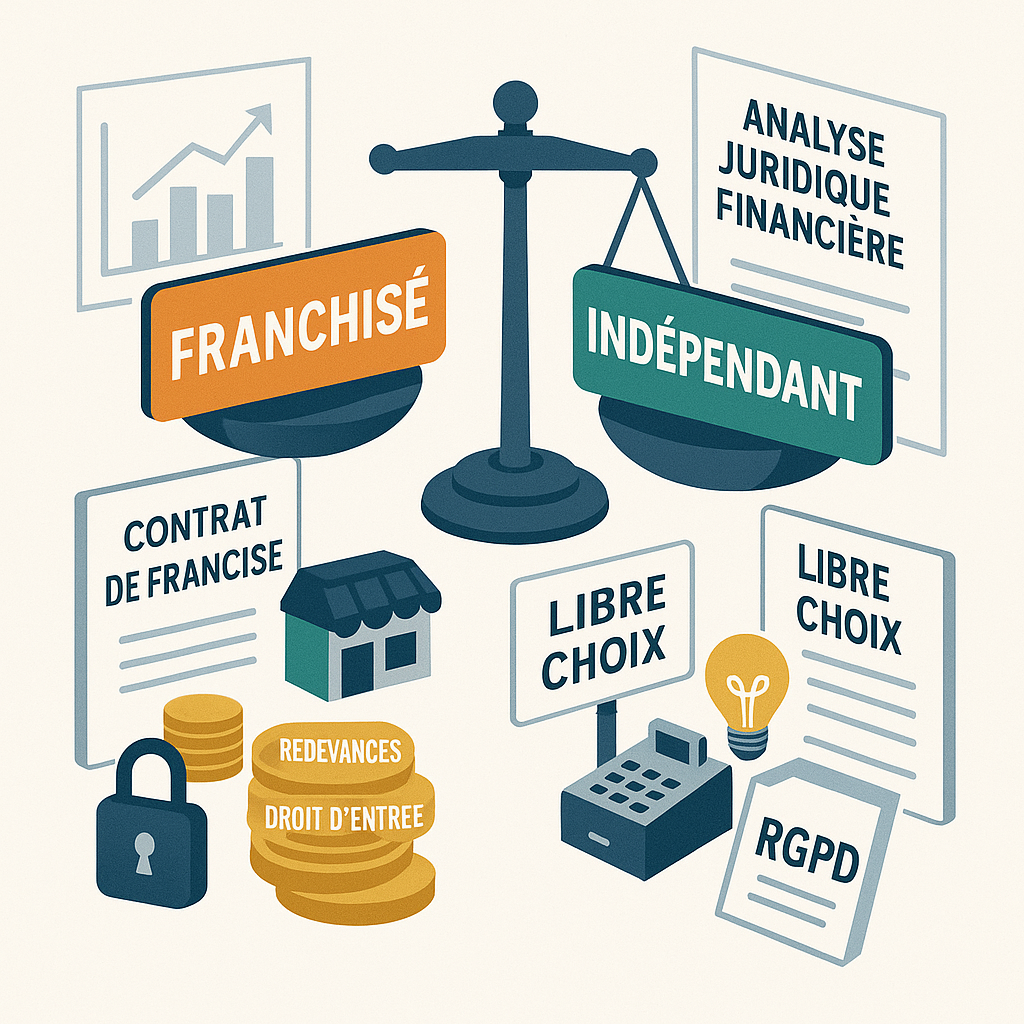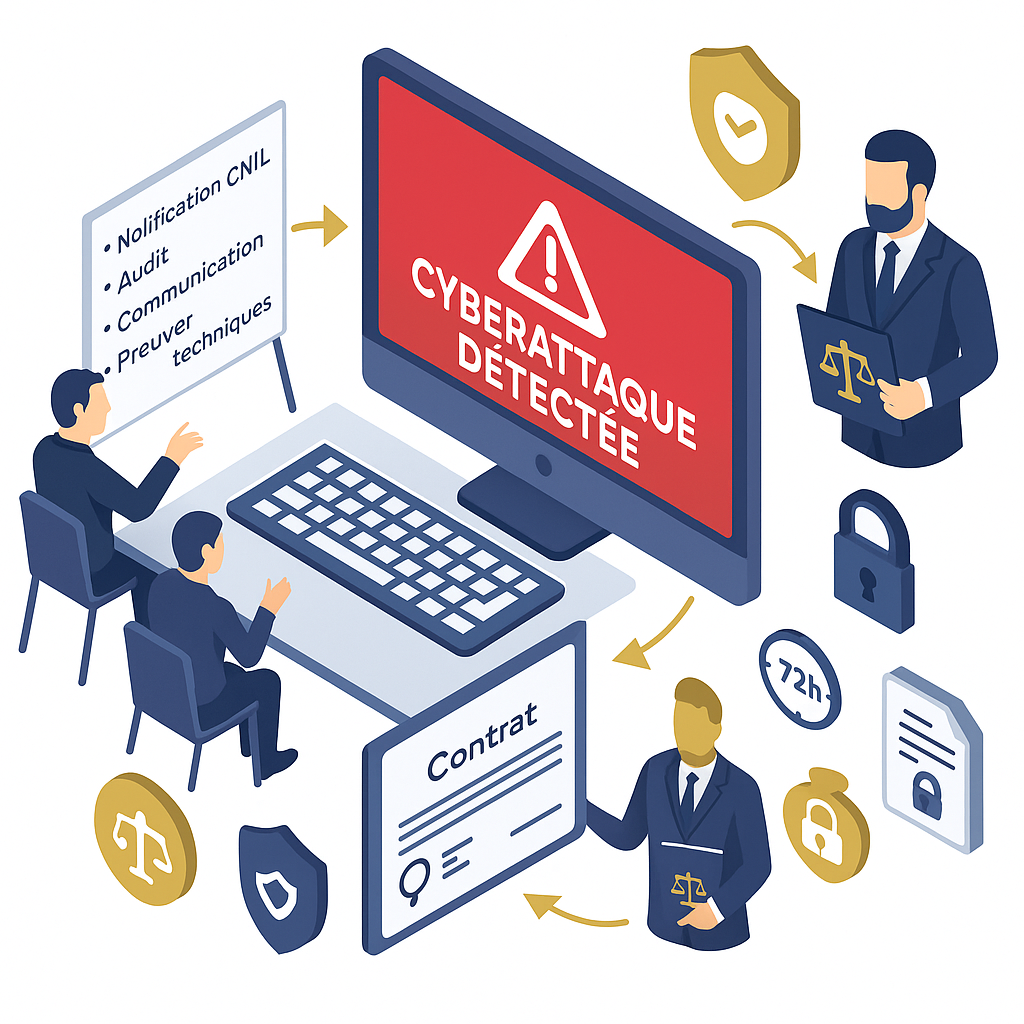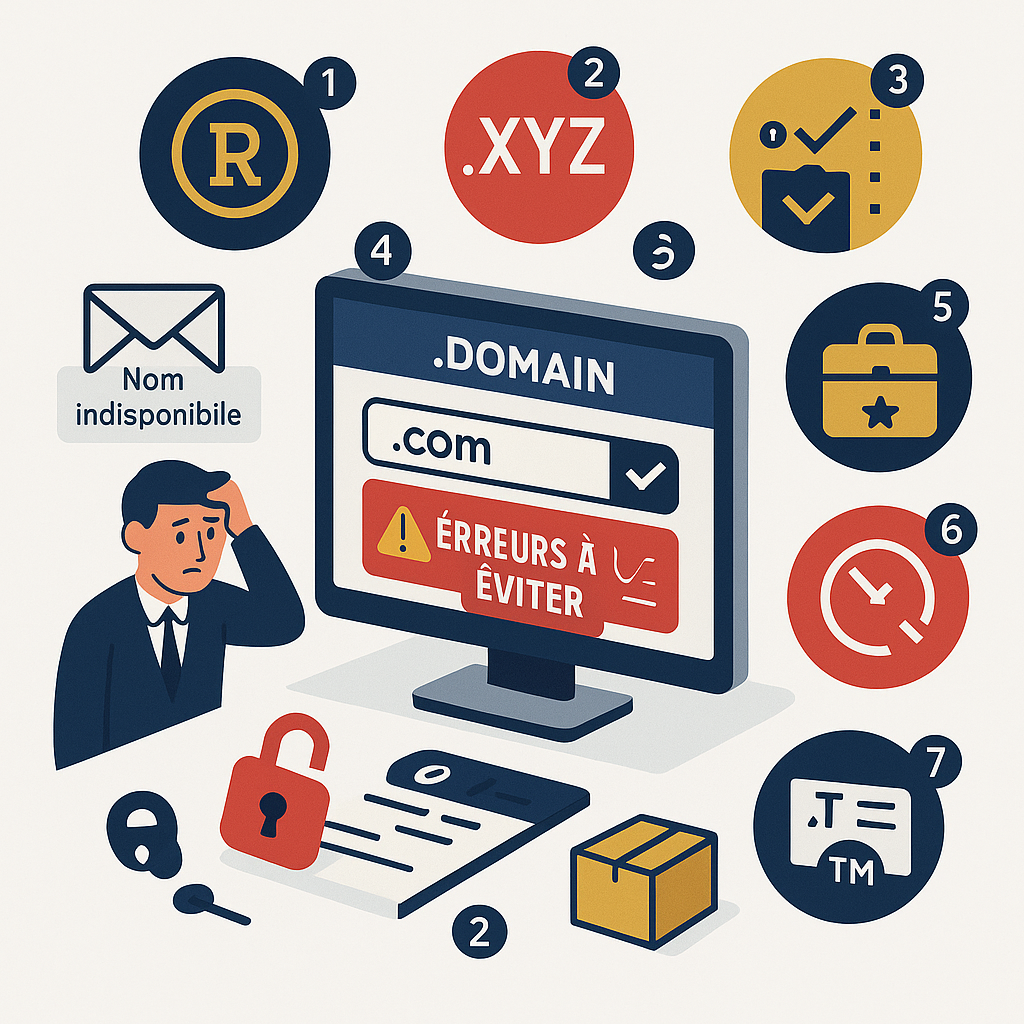Franchisee vs. self-employed? Our comparative analysis sheds light on each status and helps you make an informed choice.
Are you planning to embark on an entrepreneurial adventure, but hesitating between joining a franchise network or setting up your own independent business? This strategic decision will have major repercussions on your professional future, both legally and financially.
Our comparative analysis sheds light on the specific features of each status to help you make an informed choice.
If you need a franchise lawyer, contact me!
Legal structure: framework vs. freedom
Franchising: a precise and restrictive legal framework
Franchisees operate in a highly regulated contractual environment. The franchise contract precisely defines the rights and obligations of each party, creating a complex but clearly defined legal relationship.
In particular, this contract sets out the conditions of use of the brand and distinctive signs. It specifies how know-how, often the network's main added value, is to be passed on. The extent ofterritorial exclusivity is also defined, guaranteeing the franchisee protection against the establishment of other network members in his or her catchment area.Procurement obligations are generally spelled out in detail, as are communication and marketing rules to ensure the network's homogeneity.
This contractual structure offers legal certainty, but also significantly limits your decision-making autonomy.
Self-employment: legal freedom and greater responsibility
Independent contractors enjoy almost total contractual freedom. They are free to choose their suppliers without any external constraints, which means they can negotiate their own purchasing conditions or quickly change partners according to market opportunities. He can define his own sales policy and adapt it in real time according to customer feedback or competitive trends. Freelancers develop their own working methods without having to comply with standardized processes imposed by a third party. They can also adapt their offer according to their observations of the local market, with a degree of agility not always possible within the more rigid framework of a franchise.
However, with this freedom comes increased legal liability and the absence of a safety net in the event of commercial or legal difficulties.
Protection and legal risks: two distinct approaches
Franchising: pooling legal risks
Franchisees benefit from a form of legal risk pooling. The franchisor generally ensures that the concept complies with regulations, keeping a legal watch that benefits the entire network. He often has a legal department that advises all franchisees on common issues, enabling the costs of legal expertise to be shared. The franchisor takes charge of intellectual property protection procedures, defending the brand and other distinctive elements of the network. It also pools the costs of updating mandatory legal documents, such as general terms and conditions of sale or legal notices on websites.
However, this protection comes at a cost, and does not absolve the franchisee from his or her legal responsibility as an independent contractor. A franchise lawyer will be able to advise you on the exact extent of the protection you really enjoy in a specific network.
Self-employment: full responsibility and legal autonomy
Theindependent contractor bears sole responsibility for legal compliance. He must keep abreast of regulatory developments in his sector, which represents a considerable investment of time in certain highly standardized fields. He must take out his own professional insurance and negotiate the terms. He is solely responsible for drawing up his own contractual documents, such as general terms and conditions or customer contracts. He is also fully responsible for protecting his intellectual creations, from registering trademarks to taking legal action in the event of counterfeiting.
This autonomy implies constant vigilance, but also enables us to adapt more quickly to local or sector-specific conditions.
Case study: comparative financial analysis
To illustrate in concrete terms the financial differences between these two models, let's consider the case of a convenience store in the specialty food sector, with forecast annual sales of €400,000.
Initial investment
For the franchisee, the initial investment includes an entry fee generally set at around €30,000, which provides access to the brand and know-how. Fitting out the store to network standards represents a significant cost of around €80,000, often higher than for an independent due to the precise specifications imposed by the franchisor. Initial training is generally included in the entry fee, a significant advantage for novice entrepreneurs. Initial stock, worth around €40,000, is comparable in both models, bringing the total investment to around €150,000.
On the other hand, theself-employed person saves the entry fee, which represents a substantial saving from the outset. The cost of customizing the business premises is generally lower, at around €60,000, because you can adapt it to your means and priorities. He must, however, budget around €10,000 for external advice and training to compensate for the lack of structured support. With an identical initial stock of €40,000, his total investment amounts to approximately €110,000, i.e. €40,000 less than the franchisee.
Specific recurring expenses
The franchisee must pay an operating fee, generally calculated as a percentage of sales, often around 5%, or €20,000 per year in our example. Added to this is an advertising fee to finance the network's marketing activities, usually set at 2% of sales, representing €8,000 per year. These specific expenses therefore total €28,000 per year, a significant amount which has a direct impact on the company's profitability.
Theindependent entrepreneur is free to determine his marketing budget, which is generally lower than the advertising fee for a franchise, estimated here at €12,000 per year. He also calls on occasional external support services costing around €6,000 a year, including management, legal and commercial advice. His specific expenses therefore come to €18,000 a year, or €10,000 less than a franchise, a gap that widens as sales increase.
Comparative financial result over 5 years
Integrating these data into a 5-year financial projection, and taking into account sales growth of 10% per year for franchises (benefiting from the network's reputation) versus 8% forindependents, the results are revealing.
The franchisee has to bear a higher initial investment of €150,000, and higher recurring costs totalling around €154,000 over 5 years. However, he benefits from faster sales growth, generating a surplus of €218,000 over the independent operator over the period. Cumulative net income over 5 years is approximately €250,000, demonstrating that investing in a franchise can be a wise decision over the medium term.
Theindependent operator benefits from a lower initial investment of €110,000 and lower recurring costs of around €98,000 over 5 years. Despite slower sales growth, representing a shortfall of €218,000 compared with the franchise, his cumulative net income over 5 years is around €240,000, very similar to that of the franchisee.
This case study shows that, despite higher costs, franchising can generate slightly higher profitability in certain sectors, thanks to faster sales growth.
Intellectual property and know-how: crucial issues
Franchising: access to proven but controlled know-how
Franchisees immediately benefit from a recognized brand and its reputation, enabling them to attract customers as soon as their outlet opens. They gain access to documented, formalized know-how, sometimes the fruit of decades of experience and optimization. The methods made available have been tried and tested in other territories and markets, considerably reducing the risk of strategic errors. Franchisees also benefit from solid initial training and ongoing professional development, ensuring that their skills are regularly updated.
In return, he may not modify the processes without the franchisor's authorization, even when local adaptations would seem appropriate. The use of know-how is strictly defined in the contract, and limited to the operation of the franchise. At the end of the contract, the franchisee generally loses the right to exploit these elements, which can complicate professional retraining or the sale of the business.
The self-employed: creators of their own intellectual value
Theindependent entrepreneur gradually develops his own know-how, a process that necessarily involves adjustments and sometimes costly mistakes. He creates his brand and works patiently to build up his local reputation, a process that takes time and constant marketing investment. However, he retains full ownership of all his intellectual creations, thus constituting a valuable intangible asset. Freelancers are free to develop their methods according to their observations and customer feedback, ensuring maximum agility in the face of market changes.
This gradual development represents a significant investment in time, but is also a lasting asset that can be put to good use, particularly in the event of resale or network development.
Contractual obligations specific to franchising
Franchise agreements include a number of specific obligations that deserve special attention.
Non-competition clause
The non-competition clause generally prohibits the franchisee from engaging in a similar activity for the duration of the contract, and often for a specified period after its expiry. This restriction usually applies within a defined geographical perimeter, often correlated to the area of exclusivity initially granted. Case law strictly circumscribes the scope of such clauses, requiring them to be proportionate to the franchisor's legitimate interests, and limited in time and space. Nevertheless, these provisions can significantly reduce your future professional options, particularly if you have developed specific expertise in the sector concerned.
Supply clause
The franchisor often imposes mandatory referenced suppliers or central purchasing agencies. The aim of this obligation is to guarantee the homogeneity of the offer and the quality of products within the network. However, it can considerably limit your ability to negotiate purchasing conditions, adapt to the specificities of your local market, or take advantage of one-off commercial opportunities. In some sectors, this constraint can have a significant impact on your company's profitability, especially if the margins imposed are less favorable than those negotiable as an independent.
Reporting obligations
Franchisees are generally required to communicate their financial and commercial data to the franchisor on a regular basis. This transparency enables the franchisor to monitor the network's performance, identify best practices and detect any difficulties. However, this obligation creates an asymmetry of information, as the franchisor has full visibility of the franchisee's business without necessarily offering the same transparency in return. This situation can sometimes create an imbalance in the contractual relationship, particularly during contract renewal negotiations.
Compliance with network standards
The franchisee undertakes to comply scrupulously with the network's standards, which generally cover all visible aspects of the business. These standards cover the layout of the sales outlet, the arrangement of products, staff dress, sales scripts, and many other operational elements. This standardization guarantees a uniform customer experience across the network, but can significantly limit your ability to adapt to the cultural, social or economic specificities of your local area.
Towards an informed choice: key decision-making factors
The decision between franchising and independence must be based on an objective analysis of your personal and professional situation.
Business profile
Your need for decision-making autonomy is a determining factor in this choice. If you aspire to total freedom in your strategic and operational orientations, the independent model will correspond more closely to your aspirations. Your tolerance for commercial risk also needs to be honestly assessed: franchising reduces certain conceptual and methodological risks, but does not guarantee commercial success. Your previous experience in the sector represents a considerable asset for an independent project, while its absence can be effectively compensated for by the support offered by franchising. Last but not least, your ability to create and develop innovative processes will be more highly valued in an independent structure than in a network with standardized methods.
Available resources
Your initial available capital will directly influence your ability to join certain franchise networks with high entry fees. Your debt capacity, as assessed in particular by banking institutions, may differ depending on whether you opt for a well-known franchise or an independent project. An existing professional network in your target sector is a significant advantage for an independent project, partially compensating for the lack of notoriety provided by a brand name. Your time availability for the launch phase is also worth considering: franchising generally speeds up this critical phase thanks to proven processes, a valuable advantage if your time is limited.
Specific project
The potential of your local market needs to be analyzed in relation to the concept envisaged, as some franchise concepts are less adaptable to regional specificities. The maturity of the sector concerned also influences the relevance of each model: in emerging sectors, the agility of the independent can be an advantage, while mature sectors often benefit from the strength of established networks. The intensity of competition in your area can make the immediate notoriety brought by a franchise invaluable. Finally, sector-specific barriers to entry, whether technological, regulatory or commercial, can be more easily overcome with the support of an established network.
Maximize your chances of success: the winning strategy
Whatever your choice, certain practices will significantly increase your chances of success.
An in-depth market study specific to your location is an essential prerequisite. It must accurately analyze local demand, existing competition, and consumer habits specific to your territory. This information will enable you to refine your project or choose your franchise more wisely.
Drawing up a realistic financial forecast that takes into account the specific features of each model is crucial. This document must take into account all the charges specific to franchising or independent entrepreneurship, and provide for several development scenarios. The accuracy of this forecast will determine not only your strategic decisions, but also your ability to obtain financing.
Consulting other entrepreneurs who have made the same choice as the one you're considering can provide valuable insights. This real-life feedback is often more revealing than franchisors' sales pitches or general statistics on independent entrepreneurship.
A careful analysis of the Pre-contractual Information Document and the contract is essential before committing to a franchise. These complex legal documents contain commitments that will bind you for several years. A lawyer's assistance in this analysis can be a wise investment.
Anticipating your exit strategy from the outset will enable you to make consistent decisions over the long term. The conditions for transferring or handing over a business differ significantly from those of an independent company, and need to be integrated into your initial thinking.
Your decision, your business future
The choice between franchising and independence is neither universal nor definitive. Some entrepreneurs succeed brilliantly in a franchise before creating their own concept, while others start out as independents before joining a network to accelerate their development.
The key is to make this choice with full knowledge of the legal and financial implications, in line with your personal and professional aspirations. Meticulous analysis of the various aspects discussed in this article will enable you to undertake your business with confidence and determination, whatever model you choose.
Don't forget that this strategic decision deserves to be supported by professionals, both legally and financially, to secure your project and optimize your chances of success.




